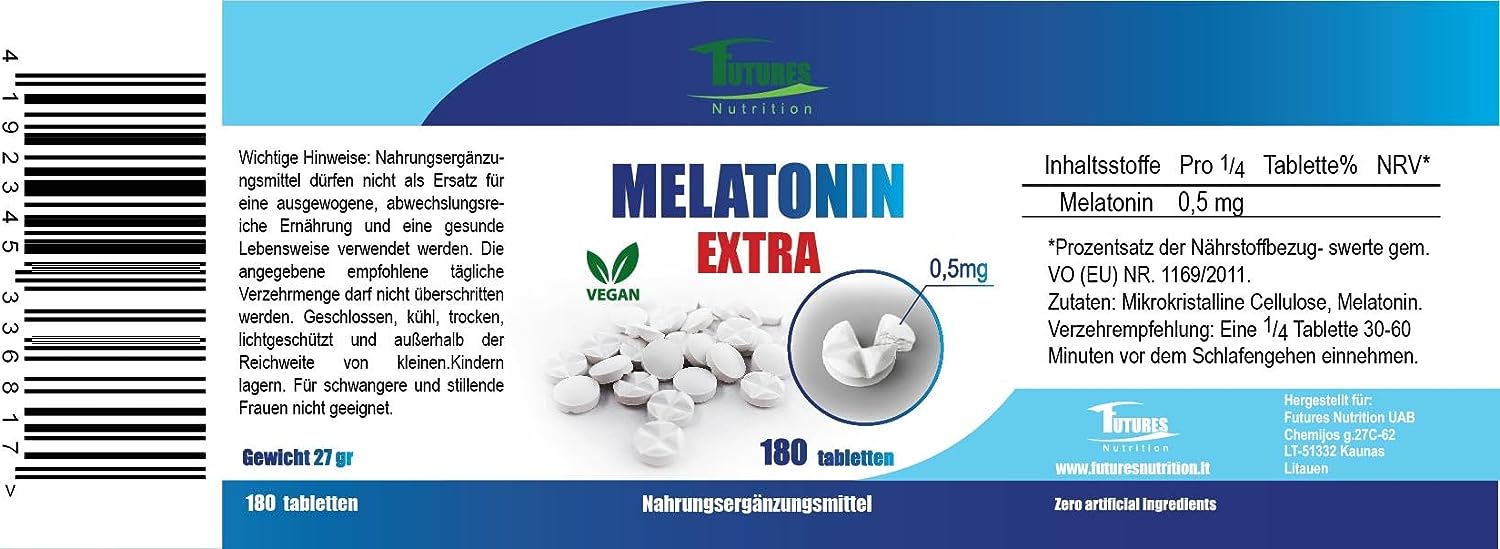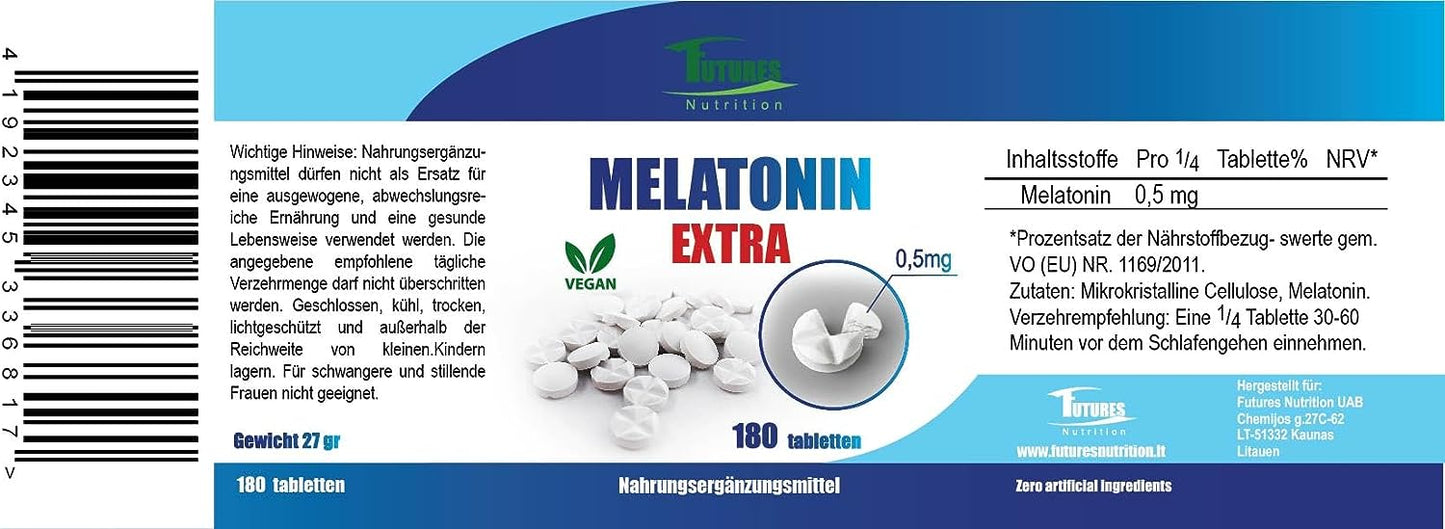Vitamina D di ottima qualità. Consiglio questo prodotto.
futuresnutrition.de
Melatonin extra, sleeping pills 3x180 tablets
Melatonin extra, sleeping pills 3x180 tablets
Couldn't load pickup availability
2 mg melatonin tablets: When and for whom are you recommended?

Melatonin, sometimes also referred to as a "sleep hormone", is becoming increasingly popular over the years as a remedy for various sleep disorders. From its natural occurrence in our body to its availability in the form of nutritional supplements, melatonin was the subject of countless research studies. However, one question remains open to many: Who should take the 2 mg melatonin tablets and when?
Natural vs. Complementary melatonin
First of all, it is important to understand that our body produces melatonin naturally. This hormone produced in the pineal gland regulates our sleep-wake rhythm. The amount of melatonin that our body produces fluctuates throughout the day, reaches its peak at night and drops during the day.
However, there are cases in which our natural production is not sufficient or our sleep-awake rhythm is disturbed. This is where additional melatonin, like the 2 mg tablets, comes into play.
Advantages of 2 mg dosing
The 2 mg dosing is considered a moderate quantity and is suitable for those who do not yet know melatonin, or for those who have identified this specific dose as their sweet spot. The advantages of this dosage include:
-Adjusted sleep cycles: For those who suffer from jet lag or struggling with shift work, 2 mg can help to reset the internal clock of the body.
- Falling asleep: Some people have problems falling asleep. A dose of 2 mg can help shorten the sleep time.
- Membership equalization: Although melatonin is primarily known for sleep regulation, it also plays a role in mood regulation, which may benefit people with mood disorders.
Who should consider 2 mg of melatonin tablets?
1. Travelers: Anyone who crosses several time zones knows how devastating jet lag can be. Taking a 2 mg tablet can help to reset the internal clock to better adapt it to the new time zone.
2. shift workers: Those who work in night shifts or irregular working hours often have disturbed sleep cycles. An even dose of melatonin can help regulate the sleep rhythm.
3. Seniors: Melatonin production tends to decrease with increasing age. Older adults could find the 2 mg tablets helpful for improving sleep quality.
4. People with certain diseases: disorders such as the delayed sleep phase syndrome (DSPS) and certain types of insomnia can be alleviated by melatonin supplementation.
5. People with stress-related insomnia: For those whose frenzied thoughts keep you awake at night, a 2 mg tablet can help to initiate a relaxing sleep.
When should the 2 mg tablet be taken?
While the exact time can vary depending on the individual needs, it is generally recommended to take the melatonin tablet 30 minutes to an hour before bed. This can absorb the nutritional supplement and begins to influence your sleep-wake rhythm.
Prevention measures and side effects
As with any nutritional supplement, it is important to be aware of possible side effects. While melatonin is generally well tolerated, dizziness, headache or stomach complaints can occur in some users. It is always a good idea to start with a lower dose and observe your body's reaction.
Also remember that melatonin can interact with certain medication or health conditions. Always consult a doctor before starting a nutritional supplement.
Finally
2 mg melatonin tablets can be a useful remedy for the treatment of sleep disorders or disorders. However, if you understand when and for whom it is most effective, you can achieve the best results. Like all aids in our health toolkit, melatonin should be careful and used in consultation with health experts. After all, a good night's sleep is a cornerstone of general well -being, and melatonin could be the keys to relaxing nights and energetic days for many.
Melatonin, sometimes also referred to as a "sleep hormone", is becoming increasingly popular over the years as a remedy for various sleep disorders. From its natural occurrence in our body to its availability in the form of nutritional supplements, melatonin was the subject of countless research studies. However, one question remains open to many: Who should take the 2 mg melatonin tablets and when?
Natural vs. Complementary melatonin
First of all, it is important to understand that our body produces melatonin naturally. This hormone produced in the pineal gland regulates our sleep-wake rhythm. The amount of melatonin that our body produces fluctuates throughout the day, reaches its peak at night and drops during the day.
However, there are cases in which our natural production is not sufficient or our sleep-awake rhythm is disturbed. This is where additional melatonin, like the 2 mg tablets, comes into play.
Advantages of 2 mg dosing
The 2 mg dosing is considered a moderate quantity and is suitable for those who do not yet know melatonin, or for those who have identified this specific dose as their sweet spot. The advantages of this dosage include:
-Adjusted sleep cycles: For those who suffer from jet lag or struggling with shift work, 2 mg can help to reset the internal clock of the body.
- Falling asleep: Some people have problems falling asleep. A dose of 2 mg can help shorten the sleep time.
- Membership equalization: Although melatonin is primarily known for sleep regulation, it also plays a role in mood regulation, which may benefit people with mood disorders.
Who should consider 2 mg of melatonin tablets?
1. Travelers: Anyone who crosses several time zones knows how devastating jet lag can be. Taking a 2 mg tablet can help to reset the internal clock to better adapt it to the new time zone.
2. shift workers: Those who work in night shifts or irregular working hours often have disturbed sleep cycles. An even dose of melatonin can help regulate the sleep rhythm.
3. Seniors: Melatonin production tends to decrease with increasing age. Older adults could find the 2 mg tablets helpful for improving sleep quality.
4. People with certain diseases: disorders such as the delayed sleep phase syndrome (DSPS) and certain types of insomnia can be alleviated by melatonin supplementation.
5. People with stress-related insomnia: For those whose frenzied thoughts keep you awake at night, a 2 mg tablet can help to initiate a relaxing sleep.
When should the 2 mg tablet be taken?
While the exact time can vary depending on the individual needs, it is generally recommended to take the melatonin tablet 30 minutes to an hour before bed. This can absorb the nutritional supplement and begins to influence your sleep-wake rhythm.
Prevention measures and side effects
As with any nutritional supplement, it is important to be aware of possible side effects. While melatonin is generally well tolerated, dizziness, headache or stomach complaints can occur in some users. It is always a good idea to start with a lower dose and observe your body's reaction.
Also remember that melatonin can interact with certain medication or health conditions. Always consult a doctor before starting a nutritional supplement.
Finally
2 mg melatonin tablets can be a useful remedy for the treatment of sleep disorders or disorders. However, if you understand when and for whom it is most effective, you can achieve the best results. Like all aids in our health toolkit, melatonin should be careful and used in consultation with health experts. After all, a good night's sleep is a cornerstone of general well -being, and melatonin could be the keys to relaxing nights and energetic days for many.










